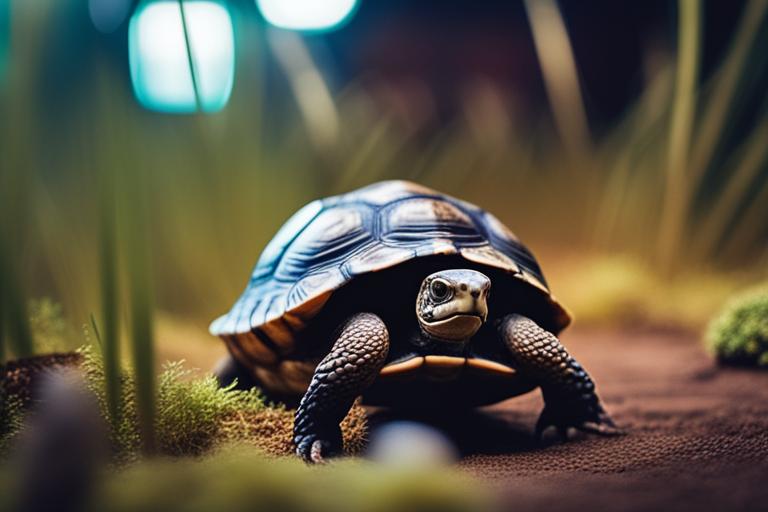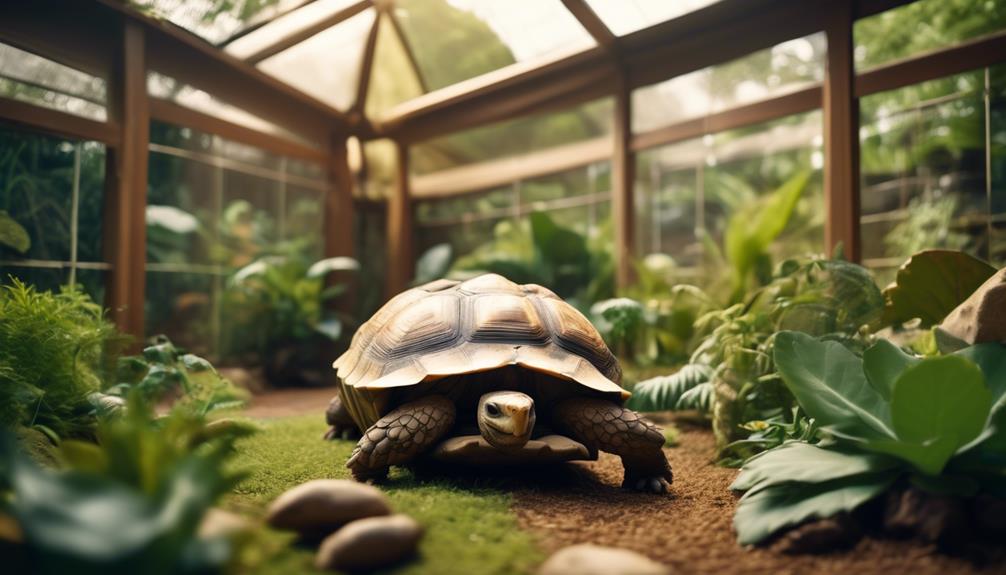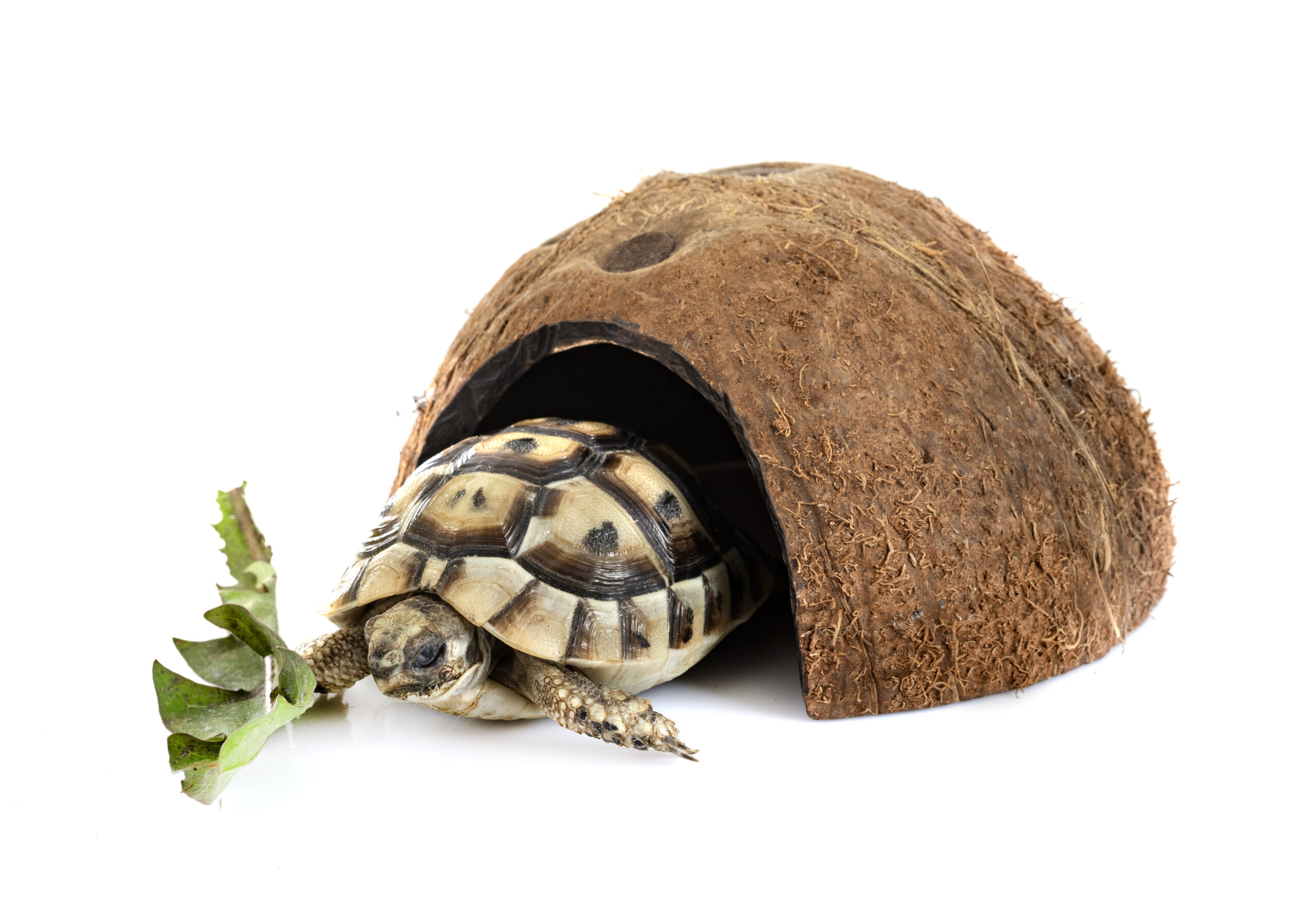Are tortoises nocturnal? This is a common question among those who are interested in keeping tortoises as pets or simply want to learn more about these fascinating creatures. In this comprehensive guide, we will explore the sleep habits of tortoises and answer the question of whether they are nocturnal.

Understanding Tortoise Sleep Habits
Tortoises are diurnal animals, which means that they are active during the day and sleep at night. However, their sleep pattern is more irregular than that of humans. Tortoises sleep in short bursts throughout the day and night, and they can sleep for several hours at a time.
Tortoises also have the ability to enter a state of torpor, which is similar to hibernation but not as deep. During torpor, the tortoise’s metabolic rate slows down, and they become less active. This is a way for the tortoise to conserve energy during times when food and water are scarce. Torpor is more common in tortoises that live in colder climates, but it can also occur in tortoises that live in warmer climates.
Tortoise Sleep Habits
- Tortoises are diurnal, meaning they are active during the day and sleep at night.
- They require 12-14 hours of sleep per day and may take naps throughout the day to rest.
- However, they may become more active during the night in cooler temperatures or if they are disturbed.

Factors That Affect Tortoise Sleep Habits
Several factors can affect the sleep habits of tortoises. These include:
Temperature
Temperature plays a significant role in the sleep habits of tortoises. Tortoises are more active when the temperature is warmer, and they are less active when the temperature is cooler. In addition, tortoises may enter torpor when the temperature is too cold or too hot.
Light
Light is another important factor that can affect tortoise sleep habits. Tortoises are more active during the day when there is sunlight, and they are less active at night when it is dark. However, artificial light can also disrupt their sleep patterns. Tortoises that are kept indoors may have disrupted sleep patterns if they are exposed to artificial light at night.
Habitat
The habitat in which a tortoise lives can also affect its sleep habits. Captive tortoises may have different sleep patterns than those that live in the wild. In the wild, tortoises can roam freely and find suitable places to sleep, while captive tortoises may be confined to a specific area.

Are Tortoises Nocturnal?
While tortoises are not nocturnal animals, they can be active at night under certain circumstances. For example, during the breeding season, male tortoises may become more active at night in search of a mate. Female tortoises may also be more active at night during the nesting season when they are searching for a suitable place to lay their eggs.
In addition, tortoises that live in areas with extreme temperatures may be more active at night when the temperature is cooler. This is especially true for desert tortoises, which are more active at night during the summer months when the temperature is too hot during the day.
| Factor | Importance |
|---|---|
| Suitable Habitat | Tortoises need a suitable habitat that allows them to move around freely and find suitable places to sleep. The habitat should also be kept at the appropriate temperature and humidity levels. |
| Suitable Diet | Tortoises that are not fed a suitable diet may have disrupted sleep patterns. Make sure your tortoise’s diet is balanced and includes a variety of foods. |
| Suitable Light Cycle | Tortoises need access to natural sunlight to regulate their sleep patterns. If your tortoise is kept indoors, provide a suitable light cycle that mimics the natural light cycle. |
| Suitable Nesting Area | Female tortoises need a suitable nesting area where they can lay their eggs. Make sure your tortoise has access to a suitable nesting area that is private and protected. |

The Importance of Adequate Sleep for Pet Tortoises
It is important to ensure that pet tortoises get adequate sleep to maintain their health and well-being. Disrupted sleep patterns can lead to increased stress and a weakened immune system. To ensure your pet tortoise gets adequate sleep, provide a suitable habitat, diet, light cycle, and nesting area.
My Experience with My Pet Tortoise’s Sleep Habits
As a tortoise owner, I have observed my pet’s sleep habits closely. While the common belief may be that tortoises are strictly diurnal animals, my experience with my pet has been quite different. I have noticed that my tortoise tends to be more active in the early morning and late evening hours, while being relatively inactive during the midday.
Additionally, I have noticed that my tortoise often takes short naps throughout the day rather than one long sleep at night. This behavior is consistent with the fact that in the wild, tortoises may need to stay alert and awake to avoid predators.
While my experience may not be representative of all tortoises, it goes to show that there can be individual variations in their sleep habits and that it’s important for tortoise owners to observe their pets closely and adjust their care accordingly.

Provide a Suitable Habitat
Make sure your tortoise has a suitable habitat that allows it to move around freely and find suitable places to sleep. The habitat should also be kept at the appropriate temperature and humidity levels.
Provide a Suitable Diet
Tortoises that are not fed a suitable diet may have disrupted sleep patterns. Make sure your tortoise’s diet is balanced and includes a variety of foods.
Provide a Suitable Light Cycle
Tortoises need access to natural sunlight to regulate their sleep patterns. If your tortoise is kept indoors, provide a suitable light cycle that mimics the natural light cycle.
Provide a Suitable Nesting Area
Female tortoises need a suitable nesting area where they can lay their eggs. Make sure your tortoise has access to a suitable nesting area that is private and protected.
Conclusion
Tortoises are diurnal animals, but they can be active at night under certain circumstances. Temperature, light, and habitat can all affect tortoise sleep habits. To ensure your pet tortoise gets adequate sleep, provide a suitable habitat, diet, light cycle, and nesting area. By doing so, you can help your tortoise live a healthy and happy life.
Questions and Answers
Who is more active, nocturnal or diurnal tortoises?
Diurnal tortoises are more active during the day.
What do nocturnal tortoises eat?
Nocturnal tortoises typically eat invertebrates.
How can I tell if my tortoise is nocturnal?
Observe their activity during the day and night.
Who should I ask if I suspect my tortoise is nocturnal?
A veterinarian who specializes in reptiles.
What are the benefits of owning a nocturnal tortoise?
They can be more active during cooler times of day.
How can I adjust to a nocturnal tortoise’s schedule?
Objection handler: Gradually adjust your own schedule to accommodate their needs.







